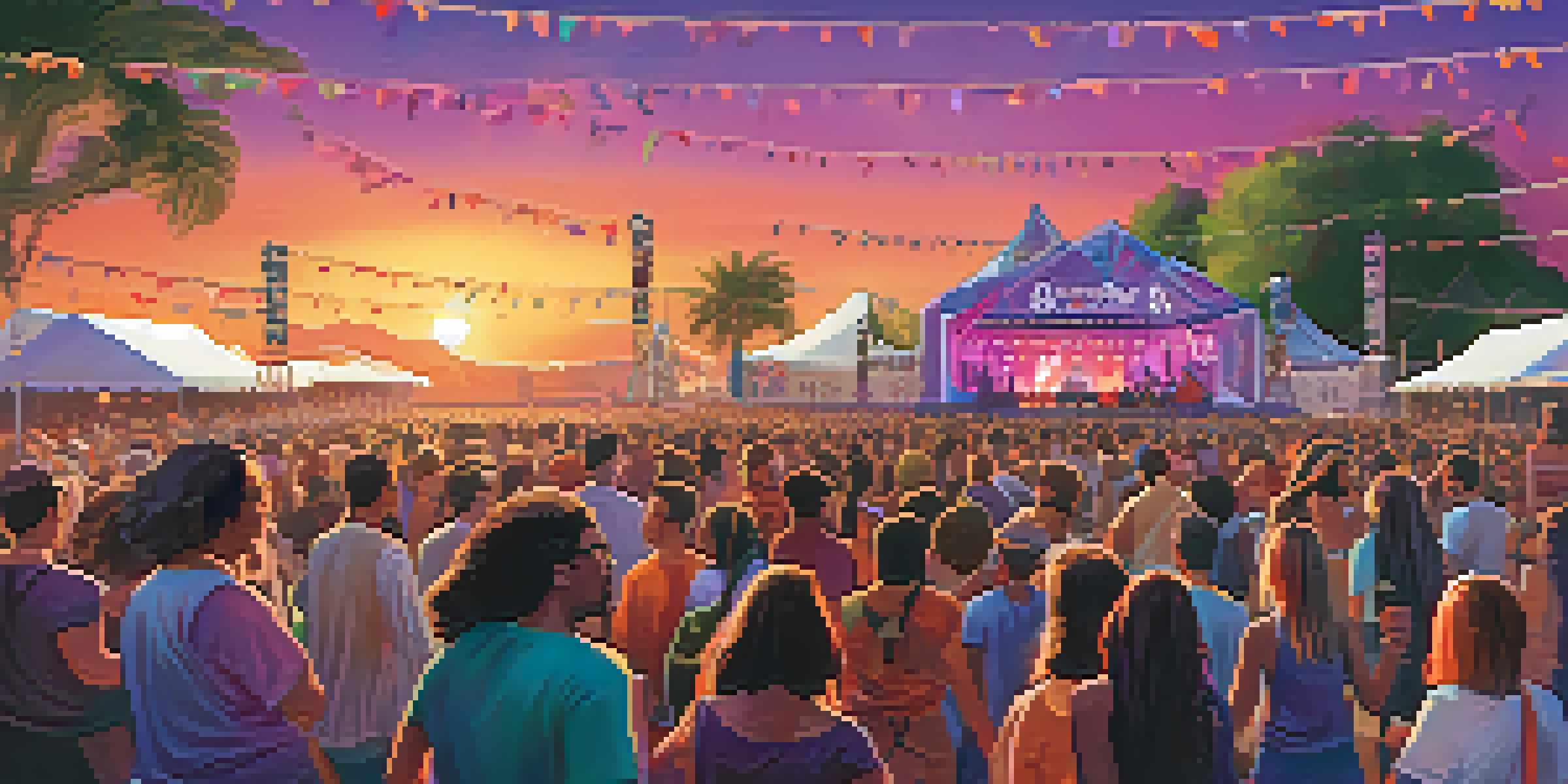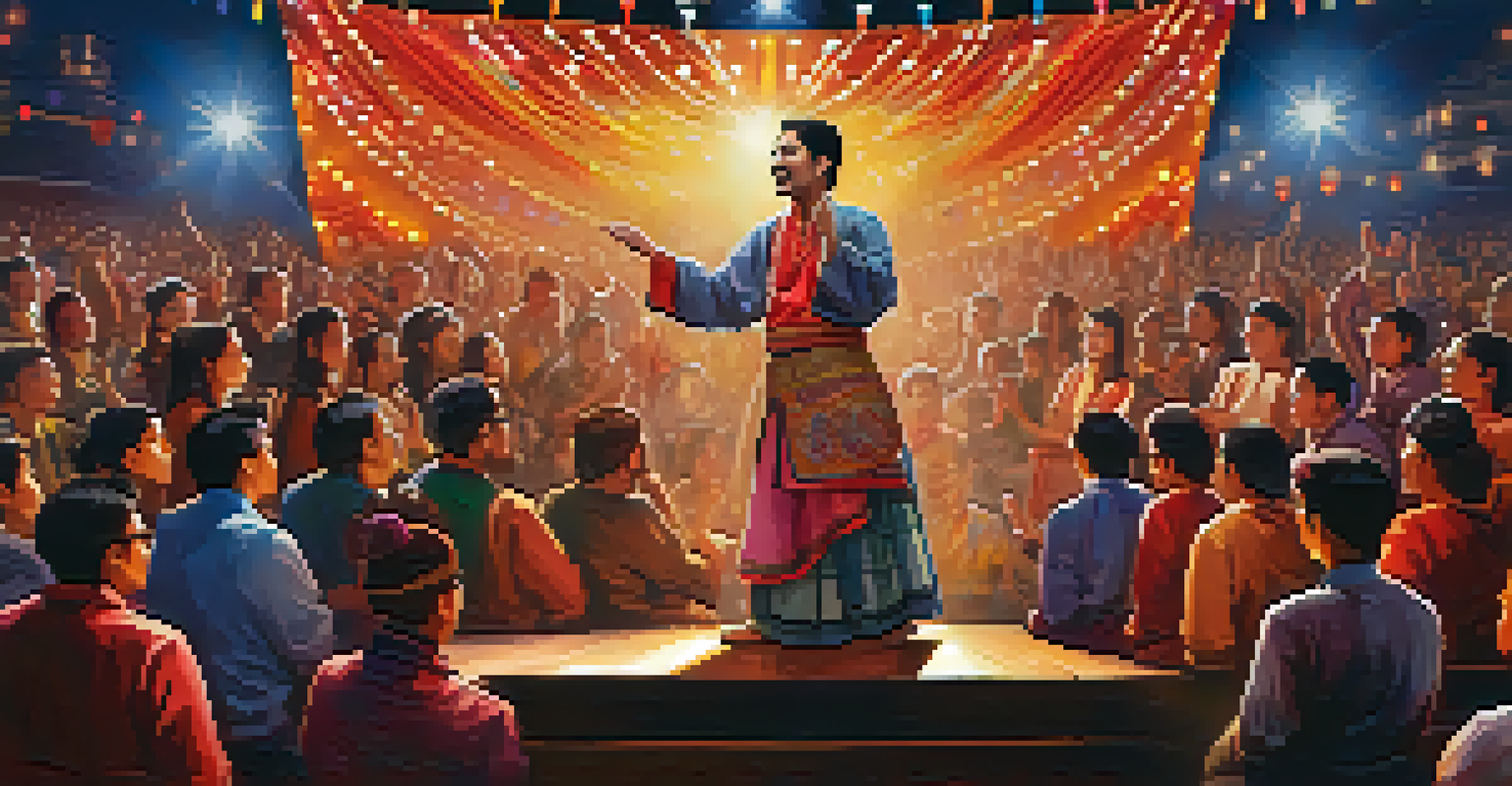The Role of Music Festivals in Celebrating Cultural Diversity

Music Festivals as Cultural Melting Pots
Music festivals are often a vibrant tapestry of cultures, bringing together different musical genres and traditions. They create a melting pot where attendees can experience the richness of global sounds in one place. For instance, a festival featuring reggae, flamenco, and K-pop showcases how music transcends geographical boundaries and fosters appreciation for various cultural expressions.
Music is the universal language of mankind.
At these festivals, attendees are not just passive listeners; they engage with artists and fellow festival-goers, creating a sense of community. This interaction allows for cross-cultural exchanges and deeper understanding among participants. Imagine chatting with someone from another country about their local music scene while enjoying a live performance—it’s a beautiful way to break down barriers.
Moreover, the atmosphere at these events encourages people to celebrate their identities while embracing the diversity around them. When we dance to the beat of a different culture, we not only learn but also celebrate the uniqueness of each tradition. Ultimately, music festivals become more than just entertainment; they are powerful platforms for cultural dialogue.
Showcasing Local Talent on a Global Stage
One significant role of music festivals is to highlight local artists alongside international stars, giving them a platform to share their unique cultural narratives. Festivals often curate lineups that feature indigenous musicians and emerging talent, allowing them to reach wider audiences. This exposure is crucial for artists who might struggle to gain recognition in mainstream music markets.

For example, festivals like Coachella and Glastonbury have been known to feature local bands that represent their cultural heritage, ensuring that these voices are heard. This not only promotes cultural diversity but also helps preserve traditional music forms that might be at risk of fading away. When people experience these performances, they gain insight into the stories and struggles of different communities.
Cultural Diversity at Festivals
Music festivals serve as vibrant platforms that unite diverse cultures, fostering appreciation for global sounds and traditions.
By celebrating local talent, festivals foster a sense of pride within communities, encouraging the preservation of cultural traditions. Attendees leave with a richer understanding of the world and a renewed appreciation for the diverse musical landscape that exists. This not only benefits the artists but also enriches the festival experience for everyone involved.
Promoting Cultural Understanding and Tolerance
Music has an incredible ability to bridge gaps between cultures, and festivals play a vital role in promoting understanding and tolerance. When people come together to enjoy music from different backgrounds, they often discover commonalities that transcend cultural differences. This shared experience fosters empathy and encourages attendees to embrace diversity in their everyday lives.
The beauty of music is that it transcends cultural boundaries and brings people together.
For instance, a festival that features artists from various cultural backgrounds can spark conversations about their traditions and lifestyles. These interactions often lead to deeper connections and a greater appreciation for the complexities of different cultures. By sharing stories and experiences through music, attendees can begin to see the world from multiple perspectives.
Ultimately, these festivals create a safe space for dialogue, where people can learn about each other's cultures in a respectful and enjoyable environment. They challenge stereotypes and promote inclusivity, helping to build a more harmonious society. In a world where division often prevails, music festivals stand as beacons of hope and understanding.
Economic Impact and Cultural Exchange
Beyond their cultural significance, music festivals also have a substantial economic impact on the communities that host them. They attract tourists, which boosts local businesses and creates job opportunities in various sectors, from hospitality to merchandising. This influx of visitors not only provides economic benefits but also encourages cultural exchange between locals and tourists.
As people flock to these festivals, they often engage with local cuisine, art, and traditions, further enriching their experience. For example, attendees might try traditional dishes or purchase handmade crafts, which supports local artisans. This exchange helps preserve cultural practices and ensures that they remain vibrant in a globalized world.
Local Artists Gain Exposure
By featuring local talent alongside international stars, festivals help preserve cultural heritage and promote unique narratives.
Moreover, the revenue generated by festivals can be reinvested into the community, supporting cultural initiatives and educational programs. By celebrating diversity through music, festivals contribute to a sustainable cultural economy that benefits everyone. It's a win-win situation where both locals and visitors leave with lasting memories and a deeper understanding of each other's cultures.
The Role of Technology in Enhancing Diversity
In today's digital age, technology plays an essential role in promoting cultural diversity at music festivals. Live-streaming, social media, and virtual reality experiences allow people from around the world to participate in events they might not have been able to attend physically. This accessibility broadens the reach of cultural expressions and brings diverse music to a global audience.
For instance, a festival that streams its performances online enables viewers from various countries to experience different cultural acts. This digital exposure can lead to increased interest in specific genres or artists, encouraging cultural exploration. As people discover new music, they often seek out more information about the cultures and communities behind it, fostering a sense of curiosity and appreciation.
Additionally, social media platforms allow attendees to share their experiences, amplifying diverse voices and creating a community that extends beyond the festival grounds. These interactions can spark conversations about cultural heritage and encourage collaboration between artists from different backgrounds. Technology not only enhances the festival experience but also cultivates a more inclusive and connected global community.
Environmental Sustainability and Cultural Heritage
Many music festivals are now embracing environmental sustainability as part of their commitment to cultural diversity. By implementing eco-friendly practices, they promote the idea that cultural celebrations can coexist with the care for our planet. This focus on sustainability often includes showcasing local artisans and products, further intertwining environmental and cultural preservation.
For example, some festivals prioritize zero-waste initiatives and encourage attendees to engage in sustainable practices, such as using reusable containers and recycling. This not only reduces their ecological footprint but also highlights the importance of respecting the environment in cultural expressions. When festivals take a responsible approach, they set an example for attendees to follow, fostering a culture of sustainability.
Sustainability and Cultural Heritage
Many festivals are embracing eco-friendly practices, highlighting the synergy between cultural celebrations and environmental care.
Moreover, initiatives that promote sustainable tourism can help protect local cultures by minimizing the negative impacts of mass tourism. By respecting local traditions and the environment, festivals contribute to the preservation of cultural heritage for future generations. In this way, music festivals can play a pivotal role in celebrating diversity while ensuring that the planet and its cultures thrive together.
The Future of Music Festivals and Cultural Diversity
As we look to the future, the role of music festivals in celebrating cultural diversity will continue to evolve. With advancements in technology and a growing awareness of social issues, festivals are becoming more inclusive and representative of the world's diverse cultures. This shift is essential for ensuring that all voices are heard and valued within the music community.
Emerging trends, such as virtual festivals and hybrid events, are redefining the festival landscape, making it easier for diverse artists and audiences to connect. These innovations offer exciting opportunities for cultural exchange and collaboration, further enriching the festival experience. As we embrace these changes, it's crucial to maintain a focus on inclusivity and representation.

Ultimately, the future of music festivals holds the promise of a more interconnected world, where cultural diversity is celebrated and cherished. By continuing to prioritize cultural representation and sustainability, festivals can serve as catalysts for positive social change. Together, we can ensure that music remains a powerful force for unity and understanding in an increasingly diverse world.